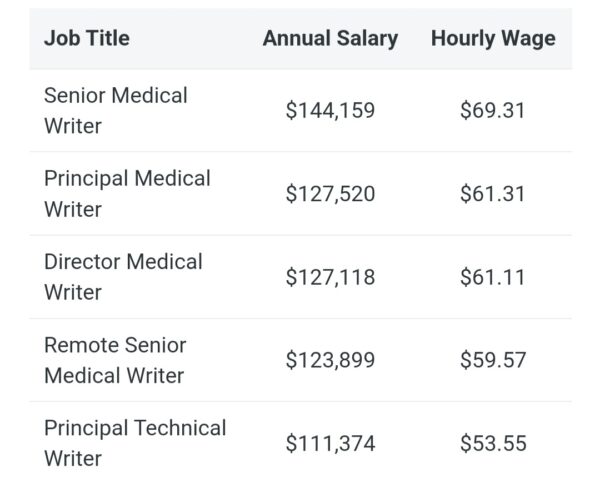The first thing to know if you want to become a remote medical writer with no experience is that you must have relevant expertise in the medical field. This is important as your writing has the power to affect lives.
If, for any reason, you’re unable to gain this expertise but want to become a medical writer, you must have your work vetted by a professional before publishing.
Being a medical writer with no experience can be quite challenging, especially with the professionalism and expertise of the industry. Becoming a writer in the healthcare industry can be a flexible and rewarding job at the same time. Plus, it can serve as an additional income when you offer medical writing services to appropriate target audiences, such as patients, healthcare professionals, and the general public, to achieve specific objectives.
So if you like writing, you can begin your journey by reading this article to help you get started on everything you need to know about the medical writer career, including the skills and how to apply for a job in the industry.
Who Is a Remote Medical Writer?
A remote medical writer is a person who writes content for doctors, nurses, and other healthcare professionals or medical publications from anywhere in the world. They are responsible for creating patient-centered instructions and different types of communication that explain medical procedures, treatments, tests, and procedures to patients. They can work in a hospital, clinic, or other healthcare facility. They may also work outside of the medical world, such as freelance writing for pharmaceutical companies and other private entities.
The remote medical writer can also provide information about new treatments or procedures to doctors who will perform them on patients to improve patient outcomes.
Career Path As a Remote Technical Writer: Everything You Need to Know
Types of medical writing jobs for freelancers
We established earlier that a remote medical writer is someone who writes to promote health and prevent disease. This can mean writing a press release, journal article, or book chapter. Many people think that a medical writer is only one type of writer, but there are many different types of writers in this field. They include;
1. Technical Writer
The first type of writer is the technical writer. These are people who write about healthcare technology and medical devices. They have an understanding of the industry and how things work. This makes them good candidates for writing about new products that come out every year or so.
2. Business Writer
The second type of writer is the business writer. These people write about marketing, sales, pricing, and distribution plans for companies that sell healthcare products or services to patients or physicians. They need to know the ins and outs of their industry to write about what it takes to succeed in that industry.
3. Product Assistant
The third type of writer is the editorial assistant/production assistant who works in publishing houses or magazines that publish scientific articles or books on topics relating to medicine, science, and health issues. They also assist with editorial projects such as developing story ideas or pitching articles to editors and other staff members within the company.
4. Continuing Medical Education (CME) Writing:
CME writing involves creating educational materials such as online courses, webinars, and training programs for healthcare professionals. CME writers must have a good understanding of medical terminology and be able to create engaging and informative content that meets the educational needs of healthcare professionals.
5. Medical Journalism:
Medical journalism involves writing articles for newspapers, magazines, and online publications that report on medical news and developments. Medical journalists must have a good understanding of medical terminology and be able to translate complex medical information into language understandable to the general public.
The last two might require you to have some sort of experience or qualifications
Toptal vs Upwork vs Fiverr: A Comprehensive Guide to Finding the Right Freelance Platform for Your Business
How to Get Started as A Medical Writer with No Experience
The truth is that nobody wants to hire a person who has no experience, but those professional writers you see today started the same way you did. They did a lot of research, learning, and practicing to get where they are. That can be you too. Here are some ways you can be a medical writer without experience.
1. Educate Yourself
To become a medical writer, it is essential to have a good understanding of the medical field, as well as the writing skills necessary to convey complex medical information clearly and concisely.
Here Are Some Ways to Educate Yourself in The Medical Field
- Be in the medical field: The easiest way to become a medical writer is by being in the medical field. You can be studying to be a doctor, nurse, or any other medical-related field and double as a writer. This way, you have firsthand experience about what you need to write.
- Online courses: Online courses are an excellent option for individuals who cannot attend in-person courses or workshops. They are usually self-paced and cover various aspects of medical writing, including medical terminology, scientific writing, and publication ethics. Some popular online courses include the Medical Writing and Editing Certification program offered by the American Medical Writers Association and the Medical Writing Certification program offered by the International Medical Writers Association.
- Webinars: Webinars are online seminars that cover a specific topic in medical writing. These webinars are often hosted by professional organizations or medical writing companies. They can be a convenient way to learn about a particular topic without the need for travel or in-person attendance.
- To be considered for a position as a remote medical writer, especially with one with no experience, you should have at least an undergraduate degree in any subject area that relates directly to writing reports and publications. You should also have experience in writing technical documents or reports on topics such as medicine and health care, biology, or chemistry.
- Read medical literature: Keep up-to-date with the latest research by reading medical journals, papers, and other literature. This will help you stay informed about the latest breakthroughs and discoveries in the field.
- Volunteer: Volunteering at a hospital or clinic can provide hands-on experience and exposure to different medical specialties. This can be a great way to gain practical knowledge and skills.
2. Develop Your Writing Skills
One way to make up for your lack of experience is to develop your writing skills.
Here Are Some Tips for Improving Your Writing Skills:
- Practice writing regularly: The more you write, the better you will become. Set aside time each day to write, even if it’s just for 15-30 minutes.
- Read widely: Reading books, articles, and other written materials can help you expand your vocabulary, learn about different writing styles, and develop critical thinking skills.
- Seek feedback: Share your writing with peers, mentors, or writing groups to receive constructive feedback on areas you need to improve.
- Learn from others: Read the work of successful medical writers and try to emulate their style and approach. Consider taking writing courses or workshops to learn new techniques and approaches.
- Use writing tools: Utilize grammar and spell-checking tools, such as Grammarly or Hemingway, to help you improve your writing.
- Edit and revise: After you’ve written a draft, take time to review, edit, and revise your work. Pay attention to sentence structure, clarity, and conciseness.
Top 12 Equipment Needed to Work From Home
3. Connect with Other Writers
Networking is a critical step towards becoming a successful remote medical writer or any other career. Networking can help you build relationships with other professionals in the field, learn about job opportunities, and stay up-to-date on the latest trends and developments.
Here Are Some Tips for Networking as A Medical Writer:
- Join professional organizations: Consider joining professional organizations such as the American Medical Writers Association (AMWA) or the International Society for Medical Publication Professionals (ISMPP). These organizations offer networking opportunities, professional development resources, and access to job boards.
- Attend conferences and events: Attend conferences, webinars, and other events related to medical writing to connect with other professionals in the field. Take advantage of networking opportunities by introducing yourself, exchanging business cards, and following up with contacts after the event.
- Participate in online forums: Join online forums, LinkedIn groups, or other online communities related to medical writing to connect with other professionals and learn about industry news and job opportunities.
- Build relationships with clients: Nurture relationships with clients by providing high-quality work, meeting deadlines, and communicating effectively. A satisfied client may recommend you to others or provide you with future work opportunities.
- Seek mentorship: Consider seeking a field mentor who can provide guidance, support, and advice on career development and networking opportunities. This person can write recommendations for you on Linkedin
4. Start Building Portfolios
A portfolio will help demonstrate your writing style, subject matter expertise, and ability to produce high-quality work.
Here Are Some Tips for Building a Portfolio:
- Choose your best work: Select writing samples that showcase your best work and demonstrate your skills in different areas of medical writing. For example, you may include representatives of scientific papers, regulatory documents, patient education materials, and marketing materials.
- Tailor your portfolio: Customize your portfolio to the specific audience or employer you are targeting. Highlight writing samples relevant to the job or project you are applying for.
- Include a variety of formats: Consider including writing samples in different forms, such as PDFs, Word documents, or online links. This can show your versatility and ability to adapt to other formats and mediums.
- Keep it up-to-date: Regularly update your portfolio with new writing samples to showcase your latest work and demonstrate that you are actively engaged in the field.
- Seek feedback: Ask for feedback on your portfolio from peers or mentors to improve the quality of your work and identify areas for improvement.
5. Find an Internship
As an aspiring medical writer who has no experience, the best way to get started will be through internships. Medical writing internships offer hands-on experience in medical writing and are a great way to gain practical skills and build a portfolio. Some companies and organizations offer internships specifically for medical writing, while others may offer more general writing or editorial internships that also include medical writing responsibilities.
Here Are Some Tips
- Reach out to potential employers: Reach out to companies or organizations that you are interested in working with and inquire about internship opportunities. You can also try cold-emailing or messaging professionals on LinkedIn to express your interest and inquire about potential openings.
- Attend networking events: Attend medical writing conferences, seminars, and other networking events to meet professionals and learn more about the industry. This can also help you to develop relationships with key players and make valuable connections.
- Volunteer or freelance: Volunteering or freelancing can help you to gain experience and build your portfolio. You can also consider writing for medical blogs or contributing to medical publications to showcase your writing skills.
- Keep an open mind: Keep an open mind and be flexible when searching for internships. You may need to consider opportunities outside of your preferred location or specialty area to gain the experience you need to start your medical writing career.
5. Apply for Jobs
When applying for medical writing jobs as remote workers, it is essential to take a strategic and targeted approach to increase your chances of success.
Here Are Some Tips for Applying for Medical Writing Jobs:
- Research the company: Research the company and the position you are applying for to understand the organization’s values, mission, and culture. This can help you tailor your application to the company’s needs and requirements.
- Customize your resume and cover letter: Customize your resume and cover letter to highlight your relevant skills, experience, and qualifications for the position. Use keywords and phrases from the job description to demonstrate that you have the specific skills and expertise the employer seeks.
- Provide writing samples: Provide writing samples that demonstrate your ability to write in different formats, such as abstracts, manuscripts, regulatory documents, or patient education materials. Choose samples relevant to the position you are applying for and showcase your best work.
- Network with professionals in the field: Network with professionals through online forums, social media, or professional organizations. This can help you learn about job openings, get referrals, or connect with potential employers or clients.
- Follow up on your application: Follow up on your application after submitting it to ensure that the employer has received it and to express your continued interest in the position. This can help you stand out from other applicants and demonstrate your enthusiasm for the job.
Tools You Need to Excel as A Medical Writer with No Experience
As a medical writer, it is essential to have access to tools that can help you produce high-quality content efficiently. Here are some writing tools that can help you network and build relationships with other professionals in the field:
- Collaboration platforms: Collaboration platforms such as Google Drive, Dropbox, or Microsoft Teams can help you collaborate with other writers, editors, or clients in real-time. These tools allow you to share files, make comments, and track changes, making it easier to work together on writing projects.
- Email management tools: Managing your email inbox can be a time-consuming task, especially when you receive a large volume of messages. Email management tools such as Boomerang, SaneBox, or Inbox Zero can help you prioritize and organize your emails, set reminders, and schedule messages to be sent later.
- Social media platforms: Social media platforms such as LinkedIn or Twitter can be helpful for networking and building relationships with other professionals in the field. These platforms allow you to connect with other writers, editors, or clients, share your writing samples, and learn about job opportunities or industry news.
- Grammar and style checkers: Grammar and style checkers such as Grammarly or Hemingway can help you improve the quality of your writing by suggesting edits, highlighting errors, and providing feedback on readability and tone. These tools can help you produce explicit, concise, and error-free content.
- Project management tools: Project management tools such as Trello, Asana, or Basecamp can help you organize your writing projects, set deadlines, and track your progress. These tools can also help you collaborate with others, assign tasks, and communicate effectively to ensure that your projects are completed on time and within budget.
Remote Work: Top 14 Tools To Make Your Job Easier
How much does a Remote Medical Writer make?
According to ZipRecruiter, the average annual pay for a Remote Medical Writer in the United States is $134,991 a year.

Conclusion
Medical writing is a great career choice for anyone who wants to work at home, be their boss, and enjoy the flexibility that working from home provides. Whichever route you decide to pursue, becoming a medical writer is a rewarding and potentially lucrative career. But the best part? You can do it from the comfort of your own home and work your hours. It’s the perfect opportunity to find the work-life balance that many of us strive for.






